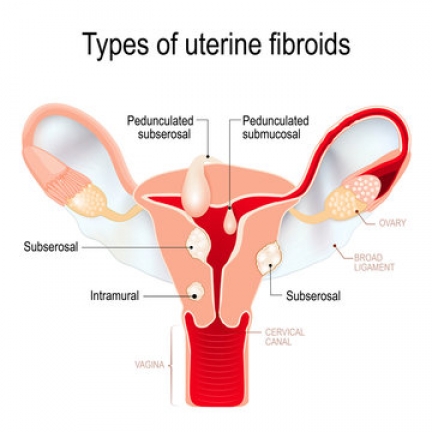What are Uterine fibroids?

Uterine fibroids are non-cancerous growths that develop from the muscle tissue of the uterus. They are called as leiomyoma or myoma. These growths can cause pain, discomfort, & other symptoms.
It is crucial to seek the best possible treatment options to manage these symptoms & prevent further complications.
Here, we will discuss the types of fibroids, their symptoms, treatment options for uterine fibroids, the best fibroid specialists in Mumbai & the expertise of Dr. Amit Sahu in this field.

Types of Uterine Fibroids
The size, shape & location of fibroids can vary. The fibroids can be located in different location within the uterus. They may be inside the uterine cavity, on its outer surface or within its walls, or project from it.
A woman may have only one fibroid or many. A fibroid may remain very small for a long time & can suddenly grow rapidly OR it can grow slowly over a number of years.
Who are likely to have Fibroids?
Fibroid is common in age of 30-40 years, but can occur at any age.
Uterine Fibroids may cause one or more of these Symptoms
- Changes in menstruation:
– Longer, more frequent or heavy periods
– Menstrual pain (cramps)
– Irregular Intermittent vaginal bleeding
– Anaemia (due to blood loss)
- Pain
– In abdomen or lower back ( dull or heavy pain)
– During sex
- Pressure related symptoms
– Difficulty in urination or frequent urination
– Constipation, rectal pain
– Abdominal cramps
- Bloating sensation
- Protruding belly
- Pain in the lower abdomen
- Miscarriages
- Problems with fertility (infertility), conceiving baby
- Depression
They may, at times, cause no symptoms at all & may be found during routine examination or during tests for other problems.
How to Confirm if you have Fibroids?
Routinely, a pelvic ultrasound (USG) may be sufficient to confirm the presence of a fibroid. At times, your doctor may even order a MRI examination depending on the symptoms.
Do All Fibroids Need Treatment?
Fibroids that do not cause symptoms, are small, or occur in a woman nearing menopause often do not require treatment. Depending on the signs & symptoms your doctor may decide whether your fibroid needs to be treated.
Treatment Options for Uterine Fibroids
Fibroid treatment can vary depending on various factors like symptoms, age & location of fibroids. Treatment options include using medications (drug therapy) or surgical or endovascular interventional procedures.
Can Medications Treat Fibroids?
Drug therapy is an option for some women with fibroids. Medications may reduce the heavy bleeding & painful periods that fibroids cause. They may, however, not prevent the growth of fibroid.
Drug treatment includes birth control pills & other hormonal medications, Gonadotropin-releasing hormone (GnRH) agonist, Progestin-releasing intrauterine device (IUD).
Procedures to Treat Fibroids
- Surgical procedures performed by Gynaecologist:
- Myomectomy is surgical removal of fibroids while leaving uterus in place.
- Hysterectomy involves surgical removal of the entire uterus.
Endovascular procedure performed by Interventional Radiologist:
Uterine artery fibroid embolization (UAE or UFE) is a ‘non-surgical’ procedure. It is done through a small injection in one the arteries in groin or wrist.
A small wire like catheter is passed into the arteries supplying the fibroids & is followed by injecting tiny particles to block the blood flow into the fibroid.
Once the blood flow to fibroid stops, it begins to shrink. Being minimally invasive, it allows faster recovery & usually requires hospitalisation for a day or two.
Benefits of Uterine Artery Fibroid Embolization
Uterine Artery Fibroid Embolization (UAE or UFE) is an internationally proven minimally invasive procedure to treat uterine fibroids.
It has several benefits including:
- No need to remove the uterus (uterus preserving procedure)
- UAE does not require incisions, cuts or stitches
- No surgical scars
- Recovery is faster
Why is Fibroid Embolization not available in all Gynaecology hospitals?
Unlike the equipment needed for fibroid surgery, equipment for the UAE or UFE procedure requires a specialised Cath Lab which is not available in all the hospitals.
Also, it is performed by Interventional Radiologists who are trained & experienced in performing uterine artery fibroid embolization.
Doctors of other specialties do not perform uterine fibroid embolization.
Importance of Uterine Fibroid Treatment
Uterine fibroid treatment is essential to relieve symptoms such as heavy bleeding, pelvic pain, pressure & improve quality of life. Treatment options may depend on the size, location, number of fibroids as well as the patient’s age & overall health.
Best Fibroid Specialist in Mumbai
India’s have some of the best fibroid specialists in Mumbai. Dr. Amit Sahu is amongst leading Interventional Radiology doctors performing uterine fibroid treatment in Mumbai, with extensive experience in the uterine artery fibroid embolization.
Best Uterine Fibroid Treatment in Mumbai
Conclusion:
Uterine fibroids can cause significant discomfort & complications. India have some of the best fibroid specialists & centres in Mumbai, including the Uterine Fibroid Treatment Centre performing Interventional Radiology fibroid treatment by Dr. Amit Sahu.
If you or a loved one is diagnosed with uterine fibroids, seek immediate medical attention from a qualified & experienced doctor such as Dr. Amit Sahu.